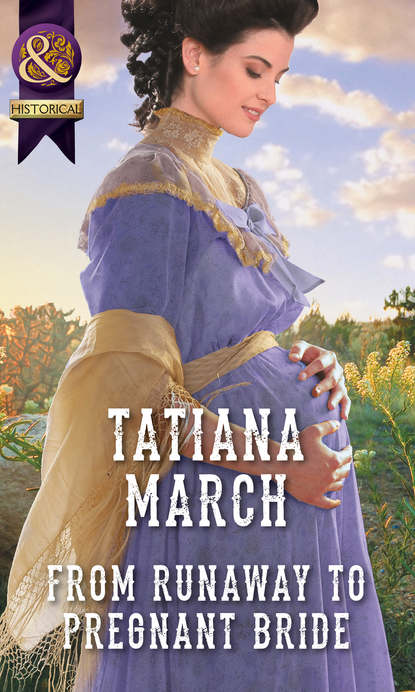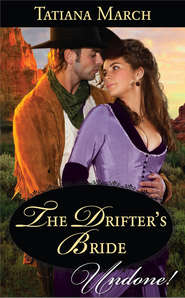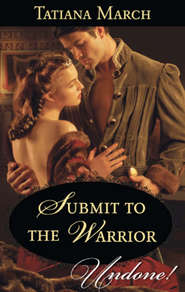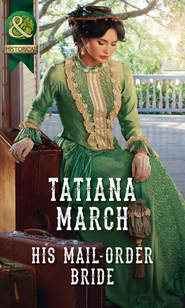По всем вопросам обращайтесь на: info@litportal.ru
(©) 2003-2024.
✖
From Runaway To Pregnant Bride
Настройки чтения
Размер шрифта
Высота строк
Поля
In a blur, he was up on the buckskin and on his way. Alarmed at the prospect of being left behind, Annabel kicked her heels into the flanks of the mule and started bouncing along.
They rode at a steady lope through the dusty desert plateau, stopping only to let the animals rest and drink every now and then. When they came to a river crossing, they refilled their canteens. At another rest stop, the stranger retreated a few paces. Turning his back, he unbuckled his belt and set to work with the buttons on his fly.
“I’ve got to go, too,” Annabel mumbled and darted off in the other direction.
The man glanced over his shoulder. “Mind the rattlers.”
Annabel’s heart was pounding while she took care of her needs behind a creosote bush. Pretending to be a boy would turn out to be a lot more complicated if she had to share close living quarters with a man, especially with a young, attractive one.
* * *
The kid had been crying. Probably had no idea the tear tracks on his dusty face gave him away. When Clay had first noticed the evidence of weeping, he’d tried to think of something reassuring to say, but words had failed him, just like they always did. He didn’t like lying, and in most cases reassurances were nothing but lies, or at best overoptimistic guesses.
The kid found a rock to stand on and mounted on the mule. It seemed to be a point of pride for the kid to climb into the saddle unassisted. Clay vaulted on the buckskin, but instead of setting off he idled closer to the mule.
“What’s your name, kid?”
“Andrew Fairfield.”
“I’m Clay Collier. The man who owns the claim is Mr. Hicks. He can be a bad-tempered devil, but he is generally fair, and he doesn’t go in for beatings.”
“How many men does he employ?”
His brows went up. “How many men?” he said with a hint of mockery. “What do you think he owns, the Vulture Mining Company?”
From the blank look on the kid’s face, Clay surmised the kid had never heard of the richest gold and silver deposit in the southwestern territories.
“You said it’s a mine.” The kid gave him a belligerent scowl.
“Out here, any shovel hole in the ground is called a mine. Where’re you from, kid?”
“Bos—New York City.”
“Well, kid from New York City, this mine employs me, and now you.”
The kid lifted his chin and spoke with a grave earnestness. “I will work for my keep. I am grateful for the opportunity.”
“Ain’t those fancy words. You must have some schooling, kid.” Clay gave him an encouraging nod. “Forget what I said about crawling into holes. Swinging a shovel and a pickaxe is just what you need. Get some meat on your bones.”
Clay took another second to make sure the kid was safely mounted on the mule before he sent the buckskin into an easy trot, satisfied that the kid didn’t seem quite so scared anymore. The familiar feelings of protectiveness surged inside him, mixed with memories of grief and guilt. He quashed the flash of regret. It would be for only a month. Surely, he’d manage to keep the kid safe that long, and could send him off along his way in better shape than he’d arrived.
* * *
The sun sank behind the hills. Twilight fell. As they gained altitude, the sagebrush gave way to pine forests. Gradually, the scenery grew rugged, with deep ravines cutting across outcroppings of gray rock.
Annabel concentrated on staying on the mule while her rescuer led the animal by the rope. Her buttocks hurt from bouncing on the pack saddle. Her stomach growled with hunger. Dust clogged her throat. But she dared not suggest that they stop for a rest, for Clay Collier might have little sympathy for weakness.
When they finally pulled to a halt, darkness blanketed the landscape. The air had turned chilly, making Annabel shiver in her thin cotton shirt and threadbare wool trousers.
Wearily, she observed her surroundings. They were in a clearing of some sort. Ahead, she could see a big, burly man looming in the light of a storm lantern he held high in the air.
Behind the man, shadows played on a solid wall of gray rock. A wooden canopy with a primitive kitchen beneath it huddled against the cliffs. To the left of the canopy, a bonfire burned, illuminating what looked like a cavernous stone overhang.
“I was worried,” the big man said. “Thought you might not make it before the storm breaks.”
“Pushed it hard,” Clay replied. “Brought you another worker. A kid from New York City. Got off the train at the water tower and was left stranded. I’ll take him back next month.”
The man stepped closer, lifting the storm lantern higher. The light fell on his features. Between the brim of his hat and the thick black beard Annabel could see a hooked nose and a pair of shrewd dark eyes.
“I’m a good worker, sir.” She deepened her voice. “I’ll earn my keep.”
The man studied her in the light of the lantern. “Polite, too,” he said. “I have nothing against a kid. It’s women I can’t abide.”
He turned his attention to Clay and questioned him about the delivery. Annabel slid down from the pack mule, alarmed by the man’s blunt words. In silence, she waited while the burly mine owner went to hang the storm lantern on a hook beneath the kitchen canopy. He returned to take the mule by the rope and led the animal to the open cavern, where he began to strip away the load.
Clay had dismounted and was moving about in the darkness. Annabel could hear water sloshing and the clang of metal, perhaps a bucket being set down on the ground, and then slurping sounds as the buckskin lowered its head and drank.
In the yellow glow of the storm lantern and the flickering flames of the bonfire, the men and animals formed eerie shadows, appearing as insubstantial as ghosts as they went about their business, appearing to have forgotten all about her.
Driven by hunger pangs, Annabel edged toward the kitchen canopy. There was a table, with four log stumps as stools, a work counter with shelves above, and a sheet metal stove, similar to the one she’d learned to use while staying with Liza and Colin in their freight yard shack.
On the stove stood a cast-iron pot. Annabel touched one soot-covered side. Still warm. She leaned closer and inhaled the succulent smells. Rummaging on the table, she found a spoon and ran her fingers over the surface to make sure it was reasonably clean before she dipped the spoon into the thick stew and ate in greedy mouthfuls.
Behind her came the thud of footsteps. Annabel spun around, feeling like a child caught at the cookie jar. Clay said nothing, merely reached over to a shelf for a tin plate and filled it with a wooden ladle he took down from a peg.
He picked out a metal spoon from a box on the counter and sat down at the table to eat. “There’s cold water to wash.” He jerked his chin toward a wooden barrel on the ground outside the kitchen canopy. “We sleep under the rock overhang,” he added. “I’ll find you a blanket.”
Shivering with cold, Annabel hugged her body with her arms. She could feel the humidity in the air, could hear the wind gathering force. “Mr. Hicks said something about a storm,” she commented. “Will it rain?”
“Like the angels are tipping buckets over us.”
Clay took another mouthful, gestured with his spoon. “Go wash your face. I’ll fix you a bed.” His eyes lingered on her. “Got no coat?”
Annabel shook her head. “I left it on the train.”
She resisted the urge to touch the money poke hanging around her neck. Instead, she pulled out the tails of her shirt and unfastened the canvas pouch tied around her waist and swung it from her fingers. “I have my own soap.”
“Your own soap, huh? Ain’t you a real gent?” Clay lowered his gaze and focused on his meal.
Annabel went to the water barrel, found an enamel bowl and a ladle propped against the side and scooped water into the bowl. A mirror fragment hung on a piece of rawhide string from a nail hammered into the canopy post. In the dim light Annabel caught her reflection. Embarrassment broke through her fatigue as she noticed the tear tracks on her dusty skin and knew Clay Collier must have noticed them, too.
She scrubbed her face clean, dried her skin with the tails of her shirt. By the time she’d finished, Clay was waiting beside her with the storm lantern. He guided her to the overhang, where a blanket had been spread out on the hard-baked earth.
“You can use your boots for a pillow.”
Annabel glanced around while Clay put away the lantern. Another blanket lay next to hers, and farther away Mr. Hicks was already stretched out and snoring, a hat covering his face. The fire had burned down to coals. The mule and packhorse filled the other end of the cavernous overhang.
“Will someone stand guard?” she asked.











